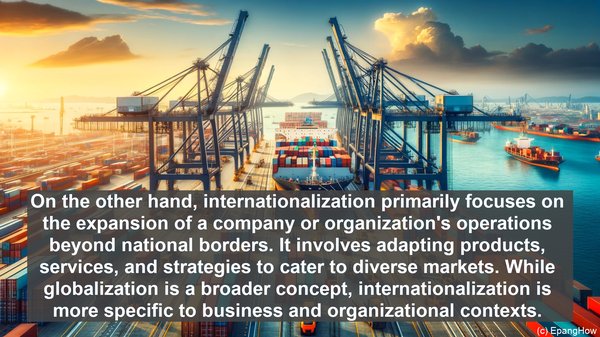Introduction: The Interconnected World
Hello everyone! In today’s interconnected world, the terms ‘globalization’ and ‘internationalization’ are often used interchangeably. However, they have distinct meanings and implications. Let’s dive into the details!
Defining Globalization: Beyond Borders
Globalization refers to the increasing interconnectedness and interdependence of countries through the exchange of goods, services, information, and ideas. It goes beyond mere international trade and encompasses cultural, political, and technological aspects as well. In essence, it’s the process of creating a global network where nations are more integrated.
Understanding Internationalization: A Focused Approach
On the other hand, internationalization primarily focuses on the expansion of a company or organization’s operations beyond national borders. It involves adapting products, services, and strategies to cater to diverse markets. While globalization is a broader concept, internationalization is more specific to business and organizational contexts.

Scope: Global vs Local
The scope of globalization is vast, encompassing various domains such as economics, culture, politics, and environment. It involves the flow of capital, labor, and resources across borders, leading to the emergence of global markets and the integration of diverse societies. In contrast, internationalization primarily deals with market-specific strategies, such as localization of products and services, understanding local consumer preferences, and complying with regional regulations.
Impacts: Wide-ranging Consequences
Globalization has transformed the world in numerous ways. It has facilitated the movement of goods, leading to increased consumer choices and lower prices. It has also fostered cultural exchange, enabling people to experience diverse traditions and perspectives. However, it has also raised concerns about job displacement, environmental degradation, and cultural homogenization. Internationalization, on the other hand, has enabled companies to tap into new markets, diversify revenue streams, and access talent globally. It has also necessitated cross-cultural understanding and the ability to navigate complex regulatory frameworks.

